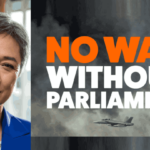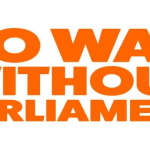Albanese Refuses Nation Any Say in Joining War on China, Explains Senator Jordon Steele-John

On Wednesday morning, Greens Senator Jordon Steele-John brought on debate over his legislation, which sought to shift the ability to make the decision on whether to enter into an overseas war away from the PM and a handful of ministers, so that it entails the entire parliament.
However, the Albanese government and the Liberal opposition voted down the option of reforming the ability to make the decision, a capacity known as war powers, that many in the community, including the group Australians for War Powers Reform, have been advocating be made for decades.
In moving to bring on debate around war powers, Steele-John not only shone a light on this antiquated approach to the decision on entering foreign theatres of war, but he’s also made clear that if war with China breaks out, the decision to enter into it sits solely with just one man.
Indeed, if US president Joe Biden decides it’s time for his country to engage in conflict with Beijing, he has to put the decision to congress, and if it votes to greenlight war, then it’s simply up to Anthony Albanese to give the nod on behalf of our entire nation to follow Washington into battle.
Ultimately a decision for US congress
The private members bill voted down by the Albanese government on 29 March was the Defence Amendment (Parliamentary Approval of Overseas Service) Bill 2020, which would have amended the Defence Act 1903 (Cth), so as to make war powers a responsibility of parliament.
The decision not to support the reform was not entirely unexpected though, as federal Labor’s form in relation to the Joint Standing Committee on Foreign Affairs, Defence and Trade Inquiry into International Armed Conflict Decision-Making, which it convened last September, hints at this.
Just days after the inquiry was established, defence minister Richard Marles wrote to the committee suggesting it not back war powers reform, while foreign minister Penny Wong said in February that it was her government’s opinion that the decision to enter war should remain with the executive.
So, as the build-up to war on China continues, with the AUKUS deal hardwiring us deeper into US foreign policy settings, while war powers is set to remain with the war cabinet, it appears that if US congress votes to engage in battle against China, its decision will be synonymous with that of our nation.
Shoring up US economic dominance
Twenty years ago last week, Australia promptly followed the US into war with Iraq based on the false claims that the Middle Eastern nation possessed weapons of mass destruction, while, right now, we’re being told we must engage militarily with China based on the lie that it poses us a threat.
But as Colonel Lawrence Wilkerson, the former chief of staff to US state secretary Colin Powell, told a recent meeting in Marrickville, the reason his nation is contemplating war with China is not because of any military threat, but rather it’s because the nation has surpassed his economically.
Sydney Criminal Lawyers spoke to Greens Senator Jordon Steele-John, straight after his war powers bill was put to the vote on Wednesday, about the debate in the chamber, why the reform is warranted and the ever-growing likelihood that our nation is going to engage in war against China.

You’ve just come from the chamber where you brought on your Parliamentary Approval of Overseas Service Bill for debate. Senator Steele-John, what was the outcome of the vote?
The outcome was that every Green voted for it, but all members of the government, opposition and crossbench senators, who were present, voted against it.
It was only the Greens in support.
The outcome is frustrating but not surprising, because we’ve seen again and again over the last 30 years, the community – and let’s remember 87 percent of people support this change – has reached out to their representatives and members of parliament have introduced this legislation.
It has been brought to a vote, debated and every single time the major parties have voted to retain the power of their executive to make one of the most difficult and dangerous decisions that a government can make, rather than require parliament to vote.
A vote for your bill would have made the decision that our nation enter into a conflict overseas, one for the entire parliament, instead of it being one for the prime minister and a few cabinet ministers he’s selected.
In your opinion, why does the Albanese government want to keep this centuries-old British royal practice alive?
They want to protect their own power. They’re interested only in continuing a tradition where the executives of both parties, in the absence of any real transparency or scrutiny, are able to make so-called national security decisions beyond the reach of the Australian public.
That happens in relation to the question of whether to go to war. It also happens on the security and intelligence oversight committee, where both governments have repeatedly refused to allow crossbench members, particularly members of the Greens, to be members of those oversight committees, which basically means that it’s a closed shop.
So, only the Liberal and Labor parties get to see the information that informs our defence and intelligence decisions and query or question them.
This is so important because what we have seen is a history of both sides of politics either backing going to war based on lies and deceptions, in terms of Iraq or Vietnam, or on faulty intelligence and the absence of a clear goal, in the case of Afghanistan.
Both sides of politics either started those wars or continued them far too long after the point of where our troops should have been brought home.
So, what we see is a pattern of bad judgement made for political self-interest. And today, was yet another example of those parties protecting themselves in their interest at the expense of the transparency and accountability that 87 percent of the Australian public demand.
And were there any aspects of the debate that are important to point out?
During the debate, Simon Birmingham contributed that he believed the Greens were wrong to assert there’s no accountability in relation to war, because cabinet members and the prime minister, as a member of the executive, are elected individuals and therefore, are held accountable, as everyone else is, at the ballot box.
So, he asserts that there is no basis to say that there is no democratic accountability for the decision to go to war.
Now, if you follow that logic through to its conclusion, that’s an argument against any form of legislation, because you can say the same thing about the decisions made by the minister for health, the minister of education or the minister for trade.
They are first and foremost an elected MP and they’ll be up for election at the next election.
So, if you take the shadow foreign affairs minister at his word, he’s actually making a case that would see more legislation taken from the purview of the parliament and retained at the discretion of the executive.
We also saw Labor make contributions in the debate which were totally disconnected from the historical record.
They talked about the danger of having the Greens anywhere near foreign policy defence decisions, because of our recklessness and because we’re not a party of government.
But if we look at the historical records, we see that it was the peace movement and the anti-war movement against the Vietnam War that gave birth to the Greens movement.
It was the Greens that had major concerns about the ramifications and the conduct of the Afghanistan War, almost as soon as it began, and were calling for it to come to an end.
On the question of Iraq, many of us cut our teeth opposing that war twenty years ago.
So, on these key foreign policy questions, whether it be going to war in the first place or critically staying there once that war had begun, it was actually the Greens who, every single time, made the right call.
The push for war powers reform has been made all the more urgent since the details of the AUKUS agreement were announced two weeks ago.
Why did the unveiling of the submarine deal lead to more urgency around the war powers debate?
AUKUS has put so much urgency around this proposal in the way that it supercharges our binding integration with the United States and the United Kingdom.
We already have intelligence services and branches of our military that are overreliant and, in some ways, dependent on those nations, and that reliance already prevents us from acting in an independent and peaceful way in our region, and it undermines the perception of independence.
What AUKUS does is take that to a whole new level: for the next 30 years, if an Australian foreign minister or defence minister is considering whether to act in Australia’s interest, even though it might be something that the US may not like, they will have weighing on their mind the reality that we’re relying on them to provide us with the technology and training for one of our core military capabilities.
That reality makes it even more likely that we will unquestioningly follow either the US or the UK into the next reckless war that they decide to start.
So, it’s really important, now more than ever, that we put a democratic mechanism in place to ensure that we don’t end up following the US or the UK into another reckless war and that the case and the facts of any proposal for deployment are able to be scrutinised thoroughly by the parliament that the people have elected.
Part of the AUKUS deal sees the US and UK establish a joint rotational submarine force in this country by 2027. This is supposed to tide us over prior to acquiring our own subs.
At the press club, Keating suggested these types of submarines are for offensive, rather than defensive, purposes.
So, given that, what are the implications of this stated need to be covered in the interim years prior to acquiring our own subs?
Key to answering the question on whether these are offensive or defensive weapons is in the name. These are attack-class submarines. They are not defence-class submarines. They are for offensive purposes.
The reason you would desire to acquire the capabilities that they have in relation to endurance is to be able to deploy them far from Australian soil – far beyond Australia’s territorial boundaries, in particular in the waters off the coast of China, and more broadly, in the South China Sea.
So, they’re an offensive capability, acquired as part of a broader push by the US, UK and other allied nations to attempt a military containment in response to what is essentially a diplomatic question.
The question of control and management of the South China Sea has only one solution, and that is a diplomatic solution, where the nations reliant on that seaway decide how they want to co-manage it together, and that’s the same in relation to Taiwan.
There is no military solution to Taiwan. There is only a diplomatic solution to Taiwan, where those two entities decide how they want to work together.
The choice is either we fight a completely unwinnable and unnecessary conflict, sacrificing the lives of our children, before we realise that, as the Greens believe, that we should not do that.
In the US, the question of entering war is put to congress, whereas in this country it basically goes to the PM.
But the Albanese government has called a war powers reform inquiry. Although, both defence minister Richard Marles and foreign minister Penny Wong have ruled out making the change prior to the inquiry completing its task.
How do you consider federal Labor’s form in terms of the war powers reform inquiry?
This inquiry is little more than a political stunt. This has been a situation where the defence minister and the foreign minister have undermined the inquiry from the beginning by ruling out the most commonsense reform on the table.
Really, the inquiry is a managed stageshow. I can be absolutely sure that both parties will not support the reforms backed by the community.
I doubt very much whether they will do more than a bit of legislative and procedural windowdressing, as the people currently with the power don’t want to give that power up.
That’s what we’re discussing here: politicians wanting to retain their power, because if and when they want to use it, they want to be able to use it as they feel fit, without interference, as they see it, from the democratically elected members of this parliament.
So, that’s what this is about.
And lastly, Senator, the 20th anniversary of the beginning of the Iraq war has just passed. The difference with that war compared to a coming one with China is that Australia has been playing a prominent role, and is becoming something of a frontline, in the build-up.
In your estimation, what’s it going to mean for our nation to follow the United States into war with China?
In the war in Iraq, Australia – the Australian community – did not want to go to war. Ninety two percent of the community opposed the war in Iraq.
Hundreds of thousands of us gathered to oppose the war in Iraq, as part of global protests that saw millions take to the streets.
The Howard government wanted us to follow Bush and Blair into the war and dragged us into it.
The reason they did is that they wanted us to join that quasi-religious Coalition of the Willing and to give America cover on the international stage for what was its illegal and immoral invasion.
What we are at risk of, in relation to a future conflict in the Asia Pacific or any other region, is being used as a staging post for the United States and being dragged into a regional conflict, which we have no need of participating in.
But this is also incredibly against our interests. China is one of the most important relationships that Australia has in the world. China is our largest trading partner.
Many Australian businesses rely on China and exports to China for their business, so to continue to escalate tension in the region will do extraordinary harm to the Australian economy.
And that is to say nothing of the impact it will have on the Chinese Australian community at a time when one in five Chinese Australians have already reported racist assaults as a result of the rhetoric unleashed during the pandemic.







